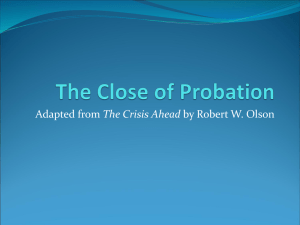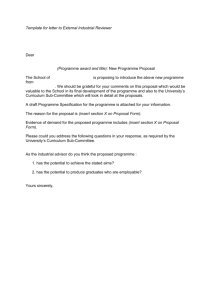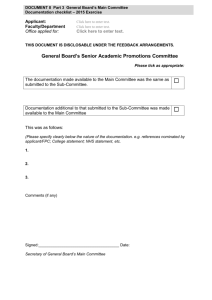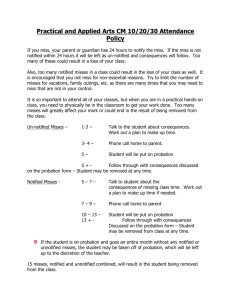Report of the Seminar for Region/Intergroup Probation/Criminal
advertisement
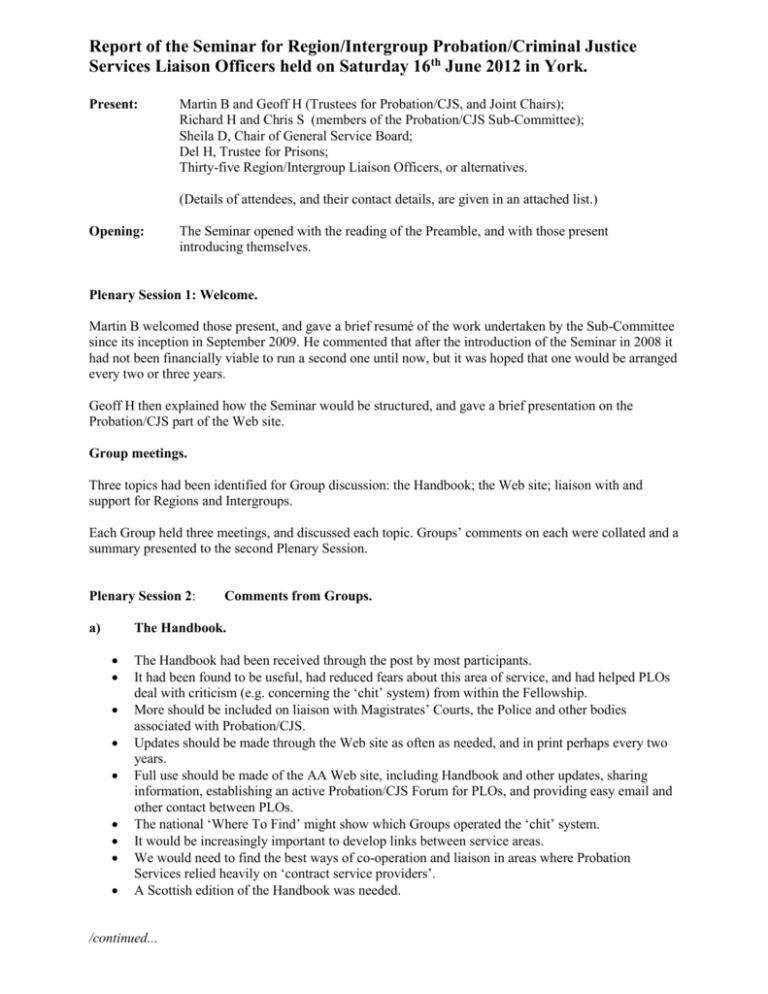
Report of the Seminar for Region/Intergroup Probation/Criminal Justice Services Liaison Officers held on Saturday 16th June 2012 in York. Present: Martin B and Geoff H (Trustees for Probation/CJS, and Joint Chairs); Richard H and Chris S (members of the Probation/CJS Sub-Committee); Sheila D, Chair of General Service Board; Del H, Trustee for Prisons; Thirty-five Region/Intergroup Liaison Officers, or alternatives. (Details of attendees, and their contact details, are given in an attached list.) Opening: The Seminar opened with the reading of the Preamble, and with those present introducing themselves. Plenary Session 1: Welcome. Martin B welcomed those present, and gave a brief resumé of the work undertaken by the Sub-Committee since its inception in September 2009. He commented that after the introduction of the Seminar in 2008 it had not been financially viable to run a second one until now, but it was hoped that one would be arranged every two or three years. Geoff H then explained how the Seminar would be structured, and gave a brief presentation on the Probation/CJS part of the Web site. Group meetings. Three topics had been identified for Group discussion: the Handbook; the Web site; liaison with and support for Regions and Intergroups. Each Group held three meetings, and discussed each topic. Groups’ comments on each were collated and a summary presented to the second Plenary Session. Plenary Session 2: a) Comments from Groups. The Handbook. The Handbook had been received through the post by most participants. It had been found to be useful, had reduced fears about this area of service, and had helped PLOs deal with criticism (e.g. concerning the ‘chit’ system) from within the Fellowship. More should be included on liaison with Magistrates’ Courts, the Police and other bodies associated with Probation/CJS. Updates should be made through the Web site as often as needed, and in print perhaps every two years. Full use should be made of the AA Web site, including Handbook and other updates, sharing information, establishing an active Probation/CJS Forum for PLOs, and providing easy email and other contact between PLOs. The national ‘Where To Find’ might show which Groups operated the ‘chit’ system. It would be increasingly important to develop links between service areas. We would need to find the best ways of co-operation and liaison in areas where Probation Services relied heavily on ‘contract service providers’. A Scottish edition of the Handbook was needed. /continued... -2b) AA Web site development. c) Overall, people consider that the new website looks better than the old one Hyperlinks in web pages to other pages on the site referred to The names of the menu items and their pages should match each other Downloadable video clips and literature A link for professionals to request AA Service News A Scottish edition of the Probation Handbook Templates for attendance chits A template for the Thames Valley Model A standard format for all site pages Clarity of the differences in the Scottish and English/Welsh Probation and Criminal Justice systems Contact details of relevant people working in this service discipline Service user forums Record of the number of hits to various parts of the site Downloadable PowerPoint presentation to professional staff. Support for Regions and Intergroups. Service seminars and workshops should be encouraged Regional PLOs should be encouraged to visit Intergroups. Email circulation lists should be made, for communication between PLOs at all levels and across the country. Great support could be given by small teams, both to PLOs and where large geographical areas were involved. Difficulties in moving forward: misinformation in the Fellowship about (e.g.) ‘chit system’ negative impressions about AA (e.g. that it was a religious organisation) lack of members available during normal working hours poor responses from Probation Offices, for various reasons dealing with ‘target-led’ cultures encourage inter-service meetings and co-operation within the Fellowship. Comments on the above, made at the Plenary Session: Be aware that there will be increasing involvement of the Health Service in Probation we should try to get invitations to co-operate in Police training Police, especially managing holding cells, should be asked to give out AA contact cards Contact between PLOs was important – either direct or through the Sub-Committee. GSO would provide Group numbers for ‘chits’ – but be aware that many Groups would not have given updated information about their meetings etc a ‘timeline’ should be prepared and circulated giving details of how and when approval was given to the use of ‘chits’ It was noted that all the above, together with other comments made by participants, would be considered by the Sub-Committee. By the end of the Seminar some of these matters would have been identified as priorities for action. (See ‘Plenary Session 4’ below.) /continued... -3- Plenary Session 3: Matters raised in response to the request circulated before the Seminar There is often confusion about the use of ‘Social Services’ in Probation literature. Martin commented that the literature was prepared for the whole of the UK, and ‘Social Services’ in Scotland included Probation. The Scottish system had now been renamed ‘Criminal Justice Services’. It was suggested that Guideline 13 and other literature drawn up for the UK should include clarification about the nomenclatures used. Do Intergroups treat Police and Courts as part of Probation Liaison? In some areas these bodies were dealt with by Public Information, in others by Probation Liaison. It was important not to be too prescriptive about our various service roles, but to get the word to the still suffering alcoholic. Good working relations between service officers could achieve great things. It was suggested that it would be timely to consider reverting to a ‘Combined Service’ structure, for several reasons. Members agreed that the main thing was to get AA’s existence drawn to the attention of those who needed it as soon as possible, even when charges were first being brought, before Probation had got involved. Are there any tips for establishing liaison with Magistrates’ Courts and the Police? Magistrates’ Courts could be approached through the Clerk to the Court, or the Chair of the Bench. Invitations to training and other meetings could be obtained this way. With the Police it was worth finding out who was responsible for training, for Police station administration, and for Reducing Reoffending teams. How do we achieve strong links between AA service areas? Nationally, Trustees for different areas kept in contact with each other. Really, this was a matter which should be looked at locally, perhaps at Region and Intergroup Conscience meetings. Is anything being arranged for AA’s Alcohol Awareness Month in November 2012? This was really down to local action, but everyone at the Seminar was urged to raise the matter at their Groups, Intergroups and Regions and to ensure that some activities were arranged. The PI Sub-Committee was writing in the very near future to all Groups etc about the Awareness Month. How can we raise the awareness about AA at the highest levels of Probation, the Police etc? Several things were already being done (meetings with NOMS, the Houses of Parliament and Scottish Parliament presentations etc) but more remained to be achieved. The Sub-Committee would be approaching the Probation Chiefs Association and other bodies. How can we best get co-operation within the Fellowship across Region and Intergroup boundaries? The best way might be to make sure that the officers in the areas all have good communication with each other. This should be helped as the Web and other ways of communicating are developed. Members thought that it was important to remember that we are all in one Fellowship, rather than confined to local area boundaries. Difficulties were best dealt with at a local level, but the Sub-Committee was there to offer assistance if asked. It was also commented that we should remember the Directory, and assume that anyone holding a service post would be willing and pleased to be asked to assist any other member who needed support. /continued... -4Plenary Session 4: Identifying what needs to be done next. Geoff presented a list of items (not in order of priority) which the Seminar members had seemed to feel were those most commonly seen to need attention in the near future. Review Guideline 13 and consider a formal revision Scottish edition of the Probation Liaison Handbook Clarify the differences between the English/Welsh and the Scottish criminal justice systems and nomenclature. Draw up a development plan for the Probation/CJS part of the AA Web site Clarify and strengthen the links between Regions/Intergroups and the appropriate Sub-Committee link member. AA Awareness Month: ‘I am responsible’ to do something Raise awareness of AA at highest levels of relevant organisations e.g. Probation, Police, NOMS Try hard to fill the vacancies on the Sub-Committee: Seminar attendees were urged to consider applying Collect ‘personal stories’ for AA Service News, the Web site etc. Seminar attendees were asked to help by encouraging members to write, then sending stories to the Sub-Committee Encourage members in Probation/CJS service to write articles for AA Service News Organize another Seminar Comments made on the above included the following: Note that there is a monthly PI Newsletter which members and professionals can sign up to receive, by contacting the PI Sub-Committee.. Seminars like this ease concerns about service, encourage participants, and aid us all in our recovery. We should be careful in our approach to Guideline 13: a formal revision will take up to four years and there are big changes to the organisation of Probation Trusts and their management in the offing. Perhaps a better and quicker move would be to provide a fuller commentary on it in the Handbook? Seminar timing: perhaps every two years would be appropriate, rather than an annual event but the maximum gap should be three years. Regions might like to co-operate to organize more local cross-Region seminars as an interim measure. Minutes of AA bodies such as Sub-Committees: circulation should be looked at to get information disseminated between service areas Thanks. Sheila, General Service Board Chair, thanked those who had traveled from all parts of the UK to attend the Seminar. She also thanked the organisers, and in particular Martin, who had completed his five-year period as Trustee for Probation/CJS, during which time he had worked extremely hard to encourage and promote this area of service. Geoff, as incoming Trustee, added his thanks to Martin, to the Sub-Committee and to Sophie and Angela on the GSO staff, who had done so much to make the day happen and work well. Close: The Seminar closed with the Serenity Prayer. Chris S, June 2012.

